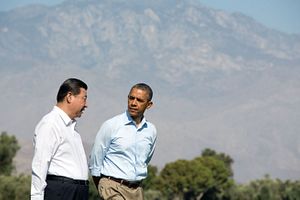As more U.S. traditional allies such as the United Kingdom, Germany, France, and Italy decide to join the China-led Asian Infrastructure Investment Bank (AIIB), people may start to wonder: Is this a sign that the U.S. is in irreversible decline?
Actually, the AIIB issue does not necessarily indicate a setback for the U.S. in the overall power game, played with an increasingly ambitious China. For one thing, we’ve yet to see a true power parity (in both the economic and military senses) between these two rivals. For another thing, as the AIIB demonstrates, China is still a regional power. However, we should start thinking about the possibility of China taking a truly leading role in a global institute (for example a “World Infrastructure Investment Bank (WIIB)” or something similar) in the future. That would truly pose a substantial challenge to U.S. predominance in the world financial system built by the U.S. after WWII.
Meanwhile, joining AIIB does not necessarily mean that these U.S. allies truly trust China’s financial skills and experience, much less Beijing’s possible political intentions. But the significance of these Western economies’ involvement is obvious to AIIB and China. And the Europeans seem to have good reasons for their decisions. As Kay Swinburne, economics spokesman for the European Conservatives and Reformists (ECR), said to Xinhua, “Being able to influence the way in which the AIIB operates will help shape infrastructure investments across Asia and ensure that the new bank encompasses high principles of governance and transparency in investment decisions.”
Nevertheless, the growing popularity of the AIIB could give China the opportunity to take a more proactive role in its intended plan to build new multilateral world institutions. In fact, the U.S. inadvertently helped facilitate such an opportunity, through its de facto containment attitude in its diplomacy toward China (especially regarding the regional territorial disputes), combined with a negative or even exclusionary policy in current multilateral economic frameworks like the International Monetary Fund and the Trans-Pacific Partnership.
In an ideal scenario, China has the money, while the U.S. has the necessary management skills and experience. Shouldn’t this combination pave the way for the two countries to cooperate regarding the reform of world financial system? But yet again, we see political differences rule over political rationality.
Still, it’s too early to conclude that China has already taken predominance in the world financial system from the United States. Both sides should not overreact to the expansion of AIIB’s prospective founding members. AIIB is a regional institute, unlike the IMF and the World Bank, in which the U.S. still acts as the leader.
However, quantitative change may eventually lead to qualitative change; the process has just begun. Could the success and possible expansion of AIIB lead to the birth of a “WIIB” or some other global scale institute in which China truly dominates? That would be more consequential for global financial leadership in the long run.
China seems to be determined and confident enough to carry out its plan of building new global institutions. The question is: what’s next?

































